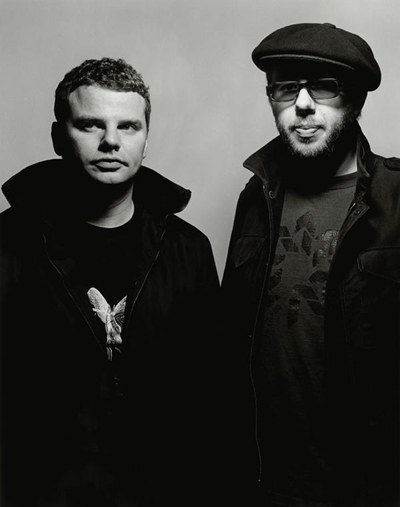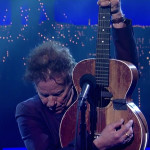Tom Rowlands, on The Chemical Brothers’ mission statement: “We wanted machines to sound like they were sweaty and deranged and wild–things people associate with rock music.”

[Photo by Hamish Brown; L to R: Ed Simmons, Tom Rowlands]
Interview by Andrew Parks
We’ve always been blown away by the people who brush off the Chemical Brothers‘ legacy without so much as a second to pause and consider the ridiculous catalog these guys have amassed over the past decade. It’s as if no one can remember a track of theirs aside from that one Oasis tune or block rocking beats jam. That’s why we asked Tom Rowlands a slew of career-skimming questions recently–to clear things up and put “electronica” in perspective once and for all. Just in time for the duo’s Brotherhood collection, too, a September 1 release that includes a singles disc and a bonus compilation of the long out of print “Electronic Battle Weapon” series, a white label-driven string of singles for DJs.
Oh, to emphasize just how deep the Brothers discography goes, we broke up every Q&A exchange with one of the group’s groundbreaking music videos.
self-titled: Let’s start with a simple question that’s bothered me since the late ’90s: Why has dance music had such a hard time in the U.S.? Even in New York, it feels like no one comes out to support DJs and producers that’d draw thousands in Europe.
I think it’s possibly just due to the size of the country–there are pockets of fervent support for electronic/dance music in the U.S., but nothing really unifies it. In the early days of the UK scene, you could have a rave bring people together from all over the country. Something like Pete Tong’s national show on [BBC]Radio1 was also an institution, giving us a cohesion that’s lacking in the U.S. There are obviously regional differences in taste and party styles, but a big record in Manchester would probably still be a big record in London.
Europe in general has a freer approach to what’s on playlists. It’s not so driven by advertisers and can take risks. Lots of powerful people in the UK music industry also lived through the acid house explosion and were genuinely moved by it–they could see how largely-instrumental, fairly-out-there records could move big crowds at raves. Why would people who loved this music on a Saturday night suddenly reject it on Tuesday afternoon!? “Jack Your Body” (by Steve “Silk” Hurley) was a big hit in 1988 despite being an underground club record. Things just move quicker here in terms of songs that are big in clubs suddenly becoming known and played on the radio. Maybe the Internet will change this in the U.S.; traditional radio is kind of [dead] there, isn’t it?
When people are exposed to good electronic music they seem to like it. The success of the dance tent at Coachella is a kind of testament to that.
“Do It Again”
[youtube=http://www.youtube.com/watch?v=atNMZS7Rfuw]
One argument promoters and producers make is that the music industry quite simply didn’t support dance music after the initial “electronica” push because it didn’t have enough marketable stars to push. In other words, it’s hard to plaster someone all over TV and radio if they’re unwilling or uninterested in putting themselves out there as a ‘face,’ not just an artist. Moby is one exception to this, and Fatboy Slim was to some extent a bit. Were you guys adverse to ‘playing the game’ in the beginning: making videos, doing tons of press and touring, etc.? Or was the promise of electronica’s supposed breakthrough in the U.S. too exciting to resist?
We always focused on making our records and playing gigs. I think something that helped us in the beginning was that we were happy to play live and go on tour. In fact, we would get asked to DJ some place and have to turn it down as we wanted to play live, not just DJ. I think that helped cement in people’s minds that we were a band who made albums, not just producers who made 12’s.
“Let Forever Be” (directed by Michel Gondry)
[youtube=http://www.youtube.com/watch?v=Hmpxsk3dHaA]
In retrospect, what do you think of electronica today? Has it lost whatever meaning it had during that initial press onslaught, or did it never carry much weight with American audiences in the first place? Was the recent trend of “nu-rave” music essentially a smaller version of what electronica tried to pull off in terms of appealing to indie rock kids and other people who wouldn’t normally listen to dance music?
It wasn’t really something to “pull off”; that was just how we naturally made records. We wanted machines to sound like they were sweaty and deranged and wild–things I suppose people associate with rock music. “Leave Home” wasn’t named after a Ramones record for nothing!
We didn’t do this with the misguided hope of attracting people who didn’t like dance music; it was just how we wanted to make records. We love acid house, techno, hip ho, My Bloody Valentine, Skinny Puppy, New Order, psychedelia–all these things feed into our approach when we are in the studio. It still excites us that DJs we respect, people who really understand club music, play our records so far into our career.
“The Salmon Dance”
[youtube=http://www.youtube.com/watch?v=kJEacTZmd7I]
You obviously got some attention for some of the stronger singles on Exit Planet Dust, like “Life Is Sweet” and “Leave Home.” Did that give you the kind of momentum that made you feel like Dig Your Own Hole could indeed be your breakthrough record in the states? Were you DJing/touring here much before Dig Your Own Hole dropped?
Yeah we played a lot in the U.S.A. around ’95/’96, but not as a plan to break America. It was just that these were the gigs we were being offered. We never took tour support from the label or saw it as part of a plan; it was just doing something we enjoyed doing, which fed into how we made records in the studio. In fact, when we first played in the states, we would just book ourselves plane tickets, take our keyboards in blankets on the plane, and wait to see what happened at the other end.
“Elektrobank” (directed by Spike Jonze and starring Sofia Coppola)
[youtube=http://www.youtube.com/watch?v=PVrA2mtrHUM]
How long did it take for you to realize Dig Your Own Hole was actually going to blow up in the states compared to most dance music of the past decade? (Not too many dance albums go gold here, you know?) Was it when “Setting Sun” got picked up by MTV and some radio outlets? Did the success of that single make you feel like it’s going to have to take a big name rock guest star to sell a dance single to U.S. audiences? Or at the very least, a very bombastic sample-based track like “Block Rocking Beats?”
Well those are two different things: a sample from an obscure Schooly D record and Noel Gallagher! Those records were made for us to play in the Heavenly Social (the Chemical Brothers’ breakthrough pub residency in the mid-’90s). They weren’t specifically designed to get played on MTV or whatever. If they had been–like many records are!–it wouldn’t have worked. They didn’t care. They were loud and mad and good!
“Hey Boy Hey Girl”
[youtube=http://www.youtube.com/watch?v=4hHsYOLETqE]
I once interviewed you guys for an Urb story surrounding the Push the Button record, and I remember you saying that you essentially gave up on the U.S. at some point, hence the rarity of your DJ appearances. Do you still feel that way? I mean, aside from that tour here last summer, we haven’t seen you guys spin here much. Is it the lack of venues? The lack of an audience? The feeling that people essentially don’t give it a shit for lack of a better term?
It’s great in America when you play and actually meet people who are really into it, but the hard facts of it is that there’s a whole world out there which is more switched on to electronic music at the moment. As from the start of our band, we go and play where people want to see us. Our gig is complicated and expensive to put on, so if we can play to 15,000 people in Milan on a Tuesday night as opposed to 1,500 in St. Louis then I think the decision really becomes obvious. That’s not to say it won’t change. Maybe the success of Daft Punk at Lollapalooza will persuade promoters, festival runners, etc. that two guys with some synths, computers and a light show can entertain a big crowd just as well as a traditional rock band.
“Setting Sun”
[youtube=http://www.youtube.com/watch?v=V7Y7fMbbaP8]
You still seem like the same guys who once spun genre-spanning sets at the Heavenly Social. In other words, you still aren’t–and never were really–a simple big-beat act. Instead, you constantly draw inspiration from all kinds of genres and artists. For instance, your last record (We Are the Night) featured Klaxons and Fatlip. The songs have a lot of variety to them, too. What I’m getting at is whether or not you’ve become cynical or frustrated with the music industry. You’re still voracious listeners right? I mean, you obviously keep up with who’s writing good music these days while never losing sight of your past. (The remixers you chose for We Are the Night‘s singles really emphasizes this point, as you chose such cutting edge producers as the Glimmers, Audion and Hervé.)
Yes, our ears are always open. We are interested in how other musicians make records–what their approach is, what their ideas are. We still DJ every so often so we both keep up with club records. It’s fun going through tunes to play, just filling your record box and seeing what happens.
“Star Guitar”
[youtube=http://www.youtube.com/watch?v=CBgf2ZxIDZk]
You played downtown LA last September for a festival. How was that? Did it renew your faith at all?
Well it was a glimpse into the fact that there is still a real rave scene in LA. I hadn’t seen that many glow sticks and fluro in a while, except maybe at a Klaxons gig! It was a proper rave-up and it was fun to play.
I’m in the studio practically every day making music. I think it is something you have to work at, especially working with sounds more than traditional composition. You got to be in the studio to make it happen … onwards and upward.

